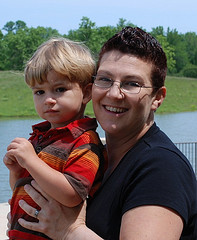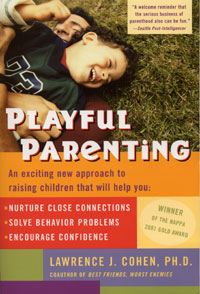By Sonya Fehér, Mamatrue.com

Bedtime is one of the most challenging times of day for me as a parent. I am tired from having taking care of a little person all day, ready to cuddle with my husband on the couch and watch a show, or check Facebook, or have any kind of leisure or work time that’s my own.
My son was two before we had a solid bedtime routine. We would read a pile of stories, then he’d crawl out of bed for more. He would nurse, then want to play or read and then nurse again. It didn’t bother me much at first because he was napping, and I got breaks during the day. Also, I listened to mamas all around me talk about their kids waking up at 6:00 a.m. and since my son didn’t go to sleep until 10:30 p.m., he slept until 9:00 or so in the morning. Much better for me since I’m a night owl.
Then we night-weaned and he started waking earlier. The long uninterrupted blocks of sleep meant he was more rested, too. He woke anywhere from 6:00 to 8:00 a.m. When the time changed, my son rose with the sun. I’ve never been so aware of dawn. I bought new curtains at IKEA and sewed black-out material into them. Still the early mornings. I couldn’t start my day at 6:30 a.m. and still be present, attached, and nice by 10:30 p.m. I needed a break.
Even though Cavanaugh was exhausted, bedtime took a couple of hours every night. My husband and I thought we were providing a routine because we’d go upstairs an hour before we intended for Cavanaugh to be asleep so he could have quiet winding down time. We’d change him into a nighttime diaper and pajamas, read stories, and then nurse. But our routine didn’t have specific limits and Cavanaugh had no idea when it was supposed to end. It finally occurred to me that Cavanaugh loved “bed” time because he was getting undivided attention from both me and my husband. He wasn’t looking at a clock and counting the hours until morning. He was lying in between us as we cuddled him and read him story after story. So we changed our routine.
We do the playing downstairs now so that just going up to the bedroom signals that it’s time for pajamas, tooth brushing, three stories, and sleep. Before the first book, his dad or I say, “Three more books and then what?” If Cavanaugh says something other than “milk” or “sleep,” we’ll remind him where we are in the routine. And most of the time, this works amazingly well. Knowing what the parameters are means that Cavanaugh can relax and enjoy the time with us. If he wants me to read the last book, he knows when there’s only one more.
But late afternoon and evening need to occur on a timetable that allows the nighttime routine to flow smoothly. We need to eat dinner between 6:00 and 6:30 p.m. We need to be upstairs by 6:45 p.m. This kind of predictability and scheduling didn’t exist in my pre-parent life. I never wore a watch. I ate cereal for dinner and went to sleep at 2:00 a.m. Some nights, I made four-course meals and was asleep by 11:00 p.m. I could do what the day called for. Those times are no more. Sure, we can make an occasional exception to the routine, but two or three nights in a row of odd circumstances mean my boy wants a little wiggle room himself. If we’re not following the schedule, why should he?
As he’s playing around, pretending to go to sleep and trying to negotiate more time with me, I’m looking at the clock thinking that for every minute he stays up later, we are in some convoluted formula that means he wakes up that much earlier the next morning. The voices in my head say it’s my fault because we weren’t home on time or I didn’t remember to start making dinner before 5:30 p.m. or…. None of this is conducive to responding to him sensitively.
Or, say, we’ve followed the routine to the letter but he isn’t going to sleep. I think back to our day full of play dates, errands, and a lot of time together though he hasn’t had much mama focus on just him. Or his dad’s working that night. Bedtime has a way of dragging out on the days when Cavanaugh most needs me and I most need a break.
On the nights when we’ve gone through the whole routine but Cavanaugh is still rolling around and bargaining for another story, index finger in the air, “Just one more,” I usually don’t want to read one more, or the one he will ask for after that. I manage to be sympathetic to his need for attention up to the point that my impatience wins out over my parenting philosophy and I end up snapping, “Cavanaugh, it’s sleeping time.” Then I give him the five-minute transition notice in an angry tone, “I will stay with you for five more minutes and then I need to go downstairs. What do you need from me to help you go to sleep?” Some nights it’s cuddle, a back rub, one more story, icy cold water. But some nights it is “five more minutes” until it’s an hour or more past his bedtime.
 This week, though, I’ve been rereading Playful Parenting by Lawrence Cohen. So last night when Cavanaugh was rolling around, being silly, asking for more of me than I had, I tried something — to playfully set the boundary. I told him, in a funny tone, that it was time to go to bed and wagged my index finger at him. My anger gave in to silliness, he was laughting, and the impending power struggle dissipated. After a couple more minutes of playing, he turned over to go to sleep. I got to tell him the limit was firm without having to use firm tones. And he got exactly what he needed, a reconnection as I looked into his eyes and acted a clown.
This week, though, I’ve been rereading Playful Parenting by Lawrence Cohen. So last night when Cavanaugh was rolling around, being silly, asking for more of me than I had, I tried something — to playfully set the boundary. I told him, in a funny tone, that it was time to go to bed and wagged my index finger at him. My anger gave in to silliness, he was laughting, and the impending power struggle dissipated. After a couple more minutes of playing, he turned over to go to sleep. I got to tell him the limit was firm without having to use firm tones. And he got exactly what he needed, a reconnection as I looked into his eyes and acted a clown.